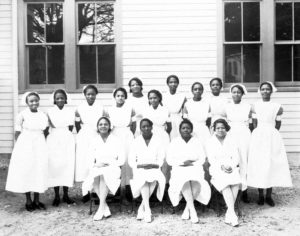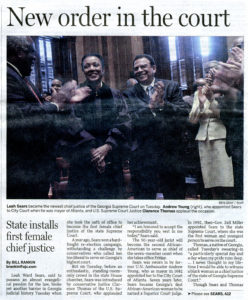Inspired by the theme for International Women’s Day (IWD) 2019, #Balance for Better, and in partnership with the League of Women Voters Coastal Georgia for National Women’s History Month 2019, this edition of Classroom Connections for Georgia Studies explores how the Georgia Historical Society helps educate the public about “the social, economic, cultural and political achievements of women” in Georgia history.
Women’s History in Georgia’s Classrooms

African American Nurses outside Charity Hospital. Foltz Photography Studio (Savannah, Ga.), photographs, 1899-1960. 1360-04-14-02.
The Georgia Historical Society is dedicated to providing standards-based, educational resources that explore Georgia and American History through the experiences of diverse people. In 2017 the National Women’s History Museum (NWHM) published a study that “examines the status of women’s history in state-level social studies standards.” The report found that women’s experiences, stories, and histories are often neglected in US history state standards. The Georgia Historical Society has created an online guide that highlights existing GHS resources that help tell the full story of Georgia history through the perspectives of women.
To learn from the experiences of Georgia’s women is to learn the story of American history. Learning from figures such as Abigail Minis, one of Georgia’s first colonists, gives insight into what it was like to live in Savannah during the American Revolution and the ways in which women experienced that crucial event. Alice Woodby McKane, the only African-American female physician in Georgia in the late nineteenth century, helps us understand access to healthcare available to African Americans during the New South Jim Crow Era. As the first woman to serve on Georgia’s Supreme Court and later as Chief Justice, Leah Ward Sears provides a unique point of view in the growth and development of the American judicial system.
According to the NWHM report, women’s domestic roles are often the highlight for women’s history in social studies classrooms. Over-emphasizing women’s domestic roles without providing context to women’s influence on and experience in broader economic, social, or political history avoids telling the whole story. Women as individuals have acted as leaders, professionals, and organizers of communities, businesses, and movements. Women as a collective make up a large share of America’s consumers, tax-payers, and laborers.

The Atlanta Journal-Constitution "New order in the court." Clipping about her appointment as Chief Justice. Leah Ward Sears papers. MS 2427-OS06-05-01.
Even though there are some women included in social studies education standards, the NWHM study found that it is more common for educators to use the experiences of men rather than women as examples in lessons. Women are not typically the first example to come to mind when teaching United States or Georgia history because useful and usable primary resources can be difficult to find and there are most likely deficiencies in teacher education regarding women in American history. There is a lot to learn from analyzing history through their point of view and using relevant female historical figures and sources helps create diverse, well-rounded social studies lessons. To explore the Georgia Historical Society’s resources concerning Women’s History and to see how you can incorporate the resources into your classroom or educational program, follow this link.
The Georgia Historical Society currently has digitized archival collections, standards-based educational material, and programs relating to women’s history. GHS is committed to continuing to develop and enhance educational resources that help teachers teach more well-rounded social studies lessons.
Further Reading:
Abigail Minis, Featured Historic Figure
Alice Woodby McKane, Featured Historic Figure
Leah Ward Sears papers available via the GHS Digital Image Catalog
Where are the Women? A Report on the Status of Women in the United States Social Studies Standards, National Women’s History Museum
To learn more about International Women’s Day or the 2019 theme #BalanceforBetter please visit: https://www.internationalwomensday.com/.
To learn more about Georgia state standards for social studies please visit: Social Studies Georgia Standards of Excellence (GSE)
